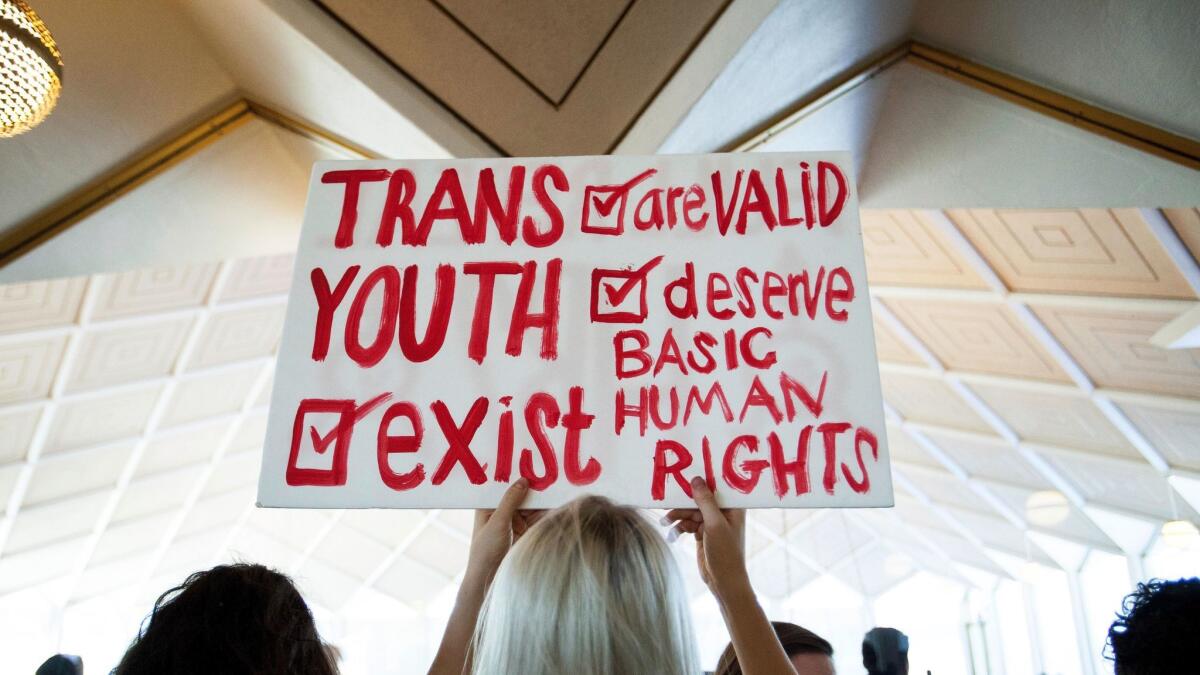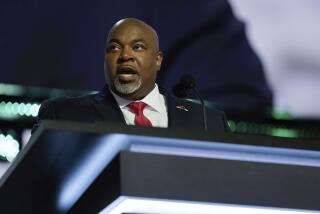Failure to repeal ‘bathroom bill’ ensures North Carolina politics will remain deeply divided in 2017

- Share via
Reporting from Atlanta — After North Carolina lawmakers refused to repeal House Bill 2, the law that curbs legal protections for LGBT people and has cost the state millions of dollars in boycotts and lost jobs, Democrats and Republicans took to a predictable pattern: blaming each other for the unraveling of the deal.
The failure to repeal the measure ensures that North Carolina politics will remained deeply divided as Democratic Gov.-elect Roy Cooper takes office Jan. 1, and the issue of LGBT protections will continue to be a source of contention in state and national politics in 2017.
Many were shocked Monday when leaders of the liberal city of Charlotte and the Republican state of North Carolina announced they had come to a deal to get rid of HB2. The plan, concocted by the Democratic governor-elect and outgoing Republican Gov. Pat McCrory, was relatively simple – but it depended on Charlotte leaders rescinding part of the city’s anti-discrimination ordinance, which expanded LGBT protections and allowed transgender people to choose restrooms according to the gender with which they identify. HB2 was initially proposed in reaction to that ordinance.
For months, Charlotte’s leaders had refused to do that. But on Monday, in an unexpected about-face, they announced they had repealed their ordinance.
McCrory then upheld his part of the bargain, summoning state legislators to a special session Wednesday to repeal HB2.
Republican leaders thought they had reached a compromise that would allow the state to move past the controversial law. But in the end, any bill they could get rural Republicans to support, they could not get Democrats to sign up on.
After a long day of backroom negotiating behind closed doors, Republican Senate leaders offered a bill that repealed HB2 while introducing a moratorium, or “cooling-off period,” that would prevent local governments across the state from crafting or changing anti-discrimination ordinances.
Democrats refused to sign.
It may have been doomed from the beginning.It started off with both sides wanting a pound of flesh from the other side, and it just went downhill from there.
— Michael Bitzer, politics professor
“It may have been doomed from the beginning,” said Michael Bitzer, a politics professor at Catawba College in Salisbury, N.C., who noted that many rural Republicans, who face re-election next year, would face outrage from their constituents if they repealed HB2. “It started off with both sides wanting a pound of flesh from the other side, and it just went downhill from there.”
The evening before Wednesday’s special session, rural Republicans who opposed repealing the law were rattled when they found out Charlotte leaders had only partially repealed the nondiscrimination ordinance. Swiftly, the city council held an emergency meeting Wednesday morning to fully repeal all the changes it made in February. But that did not allay Republican suspicion.
In the end, both the House and Senate adjourned without repealing the bill.
“Today the legislature had the chance to do the right thing for North Carolina and they failed,” Cooper said at a late-night press conference Wednesday, noting that he and his staff had consulted with legislators, businesses and activists for more than a week to build momentum for repeal. “Republican legislative leaders have broken their word to me and they have broken their trust with the people of North Carolina.”
“I’m sorry, folks. I don’t trust them and our folks don’t trust them,” Republican Senate leader Phil Berger told reporters after the Senate adjourned late Wednesday, blasting both Cooper and Charlotte’s Democratic mayor, Jennifer Roberts. “They give us no reason to trust them”
Charlotte’s LGBT residents do not face any immediate legal consequences after city officials rescinded the changes to its anti-discrimination ordinance – those components of the ordinance were already overruled by HB2. Charlotte officials cannot introduce fresh LGBT protections as the state law precludes local authorities from introducing such measures.
“While we are disappointed with this unfortunate outcome, our commitment to maintaining and protecting diverse and inclusive communities remains unchanged,” the city of Charlotte said in a statement. “We will continue to work with our partners at the state and local levels to develop a solution that protects the rights of individuals.”
The failure to repeal HB2 represents a blow not just to the LGBT community but to the entire state of North Carolina, said Chris Sgro, a Democratic representative and executive director of Equality NC.
“With HB2 still on the books and the Charlotte Ordinance fully repealed we will only continue to lose businesses and put LGBTQ North Carolinians in harm’s way,” he said in a statement. “The North Carolina General Assembly Leadership has made clear today that North Carolina remains closed for business.”
On Thursday, LGBT advocacy groups and civil rights organizations vowed to ratchet up political and economic pressure on the state. The leader of the North Carolina branch of the NAACP said he planned to request a national NAACP economic boycott of the state after the General Assembly’s failure Wednesday to repeal HB2.
“Some people like to say this is Democrat versus Republican, but this is extremism,” North Carolina NAACP President William Barber said, noting that HB2 was just one of many conservative moves by Republicans in the last month. “This is an out of control, extremist legislature, and we have to resist it in North Carolina before it spreads through the South and across the rest of the country.”
HB2 orders school and public agencies to require people to use multiple-occupancy restrooms based on the sex listed on their birth certificate. The law, which also prevents cities from extending anti-discrimination laws to LBGT people and from passing any increase in the $7.25 minimum wage, generated economic boycotts and strong condemnation from major corporations including Apple, Google and Microsoft.
PayPal abandoned its plan to bring 400 jobs to the state; entertainers such as Bruce Springsteen and Pearl Jam canceled concerts; and major sporting leagues such as the NBA, the NCAA and the Atlantic Coast Conference pulled championships and games from Charlotte.
Two months after the bill was signed, Charlotte’s Chamber of Commerce estimated the law’s economic impact on Mecklenburg County at $285 million, in addition to a loss of more than 1,300 Charlotte-area jobs.
Republicans and Democrats appear divided on the possibility of a future repeal. “I think today was our best shot,” said Brian Turner, a Democratic representative. “I don’t think there’s going to be another opportunity.”
The problem, he said, was that Republican leaders could not seem to control their representatives. “Through gerrymandering, there are now Republican seats that are so safe that the leadership has lost the ability to control them. It’s almost like a Frankenstein’s monster.”
Still, some Republican leaders said they would be committed to working out a solution in the new year. “It’s a high priority for me, and it’s a priority for many Republicans,” House Rules Chairman David Lewis said after the House adjourned. “We in the state of North Carolina are going to find a way to respect everyone’s basic human rights.
“You know, I am a Republican, and our party was founded and grew under the belief that everyone’s entitled to equal protection under the law,” he added. “Somehow we can find a way to craft legislation to find a solution.”
Some political experts expect the issue ultimately will be resolved by federal courts rather than local and state politicians. In May, the Department of Justice filed a civil rights lawsuit against the state.
“The courts are going to have the final say on HB2,” said Bitzer. “Politically, both sides are so bitterly divided and don’t seem to trust the other side at this point. At this point, I would be stunned if they came to any kind of compromise.”
Jarvie is a special correspondent.
ALSO
North Carolina lawmakers fail to repeal contentious bathroom law
In North Carolina, defeated GOP governor signs law to weaken his Democratic successor
What it’s like to live under North Carolina’s bathroom law if you’re transgender
More to Read
Sign up for Essential California
The most important California stories and recommendations in your inbox every morning.
You may occasionally receive promotional content from the Los Angeles Times.











